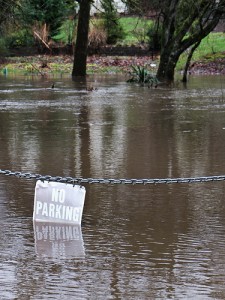
If you live in an area affected by hurricane Isaac, you will likely have some work to do on your lawn once the storm has passed. Anytime your yard has flooded, you will have to wait a while for the water to recede before you can begin doing damage control. You will likely find that the rain has carried with it a great deal of debris and sediment into your yard. The first stage of your cleanup is to remove and clear these materials from your lawn and garden.
If you have several inches of silt on your lawn, you may have to aerate your lawn. This will help break up the silt and allow water and oxygen into the roots. This can also be helpful to break up compaction that can occur to the soil when several inches of water sits on your lawn for an extended period of time. Another issue you may encounter is erosion. If your yard is flooded severely enough, it may wash away the soil and you may need to bring in topsoil to spread before replanting seed.
Pests problems can also be heightened by flooding, particularly issues with mosquitoes. Anytime there is standing water in your lawn, mosquitoes have the chance to rapidly reproduce. After significant flooding, particularly if it occurs during the warm months, you may need to consider treating your yard for mosquitoes.
To be clear, these tips apply to lawns flooded by rain (fresh water). If you live in a coastal area and your yard is flooded by salt water, there is a whole different set of issues to deal with, which we will cover next week on the blog. In the meantime, stay safe and dry out there for all of you braving the storm.